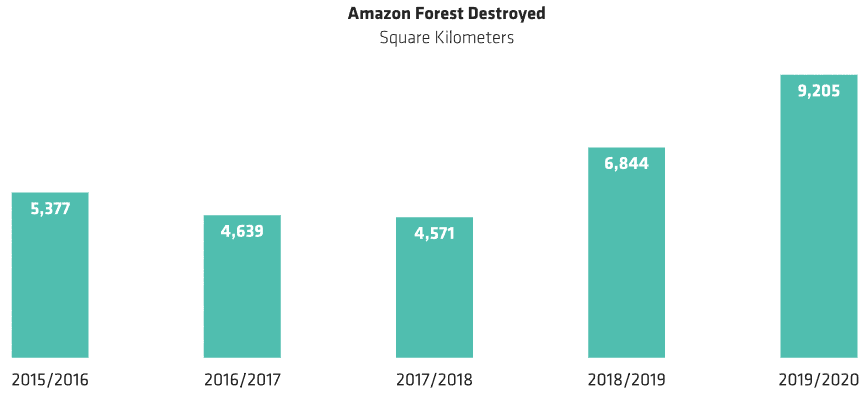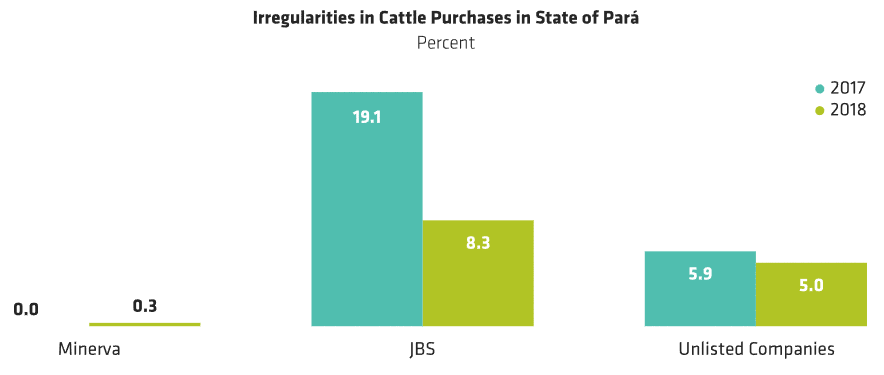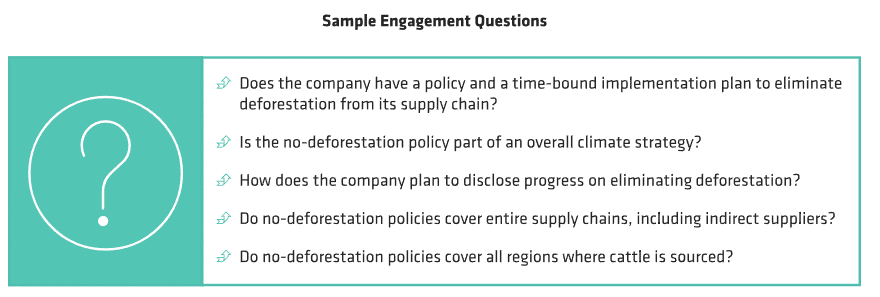Protecting the Amazon by Investing in Brazilian Beef

Ted Mann, CFA | Research Analyst—Equities Thais Aleluia | Research Analyst—Emerging Market Corporate Credit
ESG in Action
Blazing wildfires and a shift in Brazilian government policies away from environmental stewardship have thrust deforestation into the international spotlight. AB equity and credit portfolios’ large positions in Brazilian beef producers provide an opportunity to promote sustainable practices that can help protect tropical forests while mitigating environmental and investment risks.
The Issue
Brazil's tropical forests are being destroyed at an alarming rate, contributing to climate change. Cattle ranching is a leading cause of the problem.
The Investment Case
Brazilian beef companies offer attractive return potential as low-cost producers of a product with growing global demand and constrained supply.
Engagement Goals
AB is engaging with beef producers and nonprofit organizations to encourage better cattle-sourcing policies that can help combat illegal deforestation.
Brazil’s rate of deforestation has increased dramatically since President Jair Bolsonaro took office in January 2019. Tropical forests are critical to mitigate climate change, as they store large amounts of carbon, which helps to reduce greenhouse gas emissions. Cattle ranching is one of the leading causes of deforestation because fires are often set illegally to clear vast swaths of forest for grazing. Environmental groups, companies and investors have urged the government to reconsider policies that loosen protection of lands for commercial purposes. The government is also under pressure to tighten enforcement of regulations that prevent forest exploitation—particularly for cattle grazing and soybean growing. Meanwhile, the largest beef producers are responding by committing to implement no-deforestation policies across supply chains. But there’s more work to be done, and investors can promote sustainability by engaging with companies.
Scientific Evidence Shows Growing Deforestation
The scientific evidence is indisputable. Brazil’s National Institute for Space Research (INPE) reported that more than 9,200 square kilometers of the Amazon’s forest were destroyed from August 2019 through July 2020, a 34% increase, compared with the 12-month period ending July 2019 (Display 1). INPE reported more than three times as many fires in Brazil’s Pantanal wetlands, a UNESCO World Heritage site that is one of the largest and most biodiverse floodplains on the planet, from January to August 2020, compared with the same period in 2019. Pantanal spans two states that are home to an estimated 25% of Brazil’s cattle herd, and the fires threaten to intensify a shortage of cattle, which account for about 80% of meatpacking costs.
Display 1: Deforestation in Brazil Has Increased Dramatically

Through July 31, 2020 Data shown from August 1 to July 31 in each pair of years Source: Brazil’s National Institute for Space Research (INPE)
According to INPE, from 2004 to 2014, 65% of the Amazon biome deforestation was caused by the opening of new areas for pasture. Typically, ranchers set fires to forest areas, use the newly created pasture to raise cattle for income and eventually seek to sell the land to farmers at a profit. International scrutiny over Brazil’s escalated rate of deforestation has significantly increased. In May, more than 40 European companies threatened to boycott Brazilian products if the government failed to crack down on deforestation. One month later, 29 financial institutions with more than $3.7 trillion in assets warned the Brazilian government that the situation could lead to divestment from the country.
Why Invest in Brazilian Beef?
Given the scale of the deforestation crisis, it might seem counterintuitive to invest in Brazilian meatpackers. At AllianceBernstein (AB), however, we believe that investors who engage constructively with companies and policymakers can play an important role in promoting sustainable policies. While avoiding or divesting from Brazilian beef producers would decrease our portfolios’ exposure to deforestation risk, it would not help reduce deforestation.
Some of our equity and fixed-income portfolios hold positions in Minerva and Marfrig, two of the largest meat companies. Brazilian beef producers rank among the largest in the world and enjoy strong growth drivers. The investment case for select companies is compelling, in our view. Beef consumption in Asia is rising, supply is constrained, and Brazilian companies are the lowest-cost producers among major countries globally.
For these companies, the challenge is to keep up with growing global beef demand while monitoring a highly complex cattle supply chain (Display 2). There are numerous stages in the supply chain—from breeders to ranchers, which specialize in rearing young cattle, to “final fattening” operations, which sell directly to slaughterhouses (direct suppliers).
Display 2: Monitoring Brazil’s Complex Cattle Supply Chain

Source: AllianceBernstein (AB)
Monitoring Supply Chains: The Key ESG Challenge
In recent years, the industry has made substantial progress in monitoring direct cattle suppliers, which are typically larger and more professional operators. Leading beef producers use government databases and satellite data to help identify cattle-ranching operations linked to deforestation. They’ve also joined important initiatives, such as a zero-deforestation protocol launched by Greenpeace and compliance agreements with local prosecutors, which require independent audits and a commitment to screen suppliers. In 2017 and 2018, for instance, Minerva’s official third-party audit, conducted by Grant Thornton, found near zero noncompliant direct cattle purchases in a large sample (Display 3). Similar results were found for Minerva in a 2019 audit by BDO.
Display 3: Minerva’s Cattle Purchase Audits Show High Rates of Compliance

As of December 31, 2018
Based on latest data available reported in Armelin, Mauro J. Capóssoli; Burnier, Pedro Carvalho; Grossi, Natália Tiso B. R. Terms of Adjustment of Conduct in Pará and the Public Commitment on Cattle Ranching: the Importance of Beef Traceability in Reducing Deforestation in the Amazon. Amigos da Terra—Amazônia Brasileira, 2020.
https://www.eminvestorsalliance.org/sites/default/files/d/WGCalls/adt-10_years_of_tac.pdf
Source: Amigos da Terra and AllianceBernstein (AB)
But are the industry’s systems for monitoring direct suppliers fully reliable? They may fail, for instance, to screen for cattle that have been intentionally “laundered” via compliant suppliers. Monitoring systems must also be expanded to incorporate biomes outside the Amazon, including the Cerrado. While there remains ample room for improvement, we’re encouraged that leading meatpackers have sufficient information and technology systems to ensure that their direct cattle suppliers will soon be compliant.
Monitoring indirect suppliers is a bigger challenge, and the large beef producers still have a long way to go to ensure compliance. According to the National Wildlife Federation, nearly 60% of cattle-linked illegal deforestation occurs outside the scope of meatpackers’ direct suppliers. The key hurdle is that the information systems for tracking cattle as they change hands through the supply chain are limited. As a result, it’s difficult for meatpackers to guarantee that the cattle they’re purchasing were not reared on ranches linked to deforestation at some point.
The National Wildlife Federation has spent several years developing a new tool, Visipec, intended to bridge the gaps in the information systems required to monitor indirect suppliers. Minerva is currently testing out the system and hopes that it can help the company bridge the gaps in monitoring indirect suppliers. Several other NGOs—including ProForest, WWF, and Amigos de Terra—have been developing tools and policy recommendations to address the challenges of monitoring indirect suppliers.
What Is AB Doing? Engaging with Stakeholders to Promote Change
AB’s holdings in Brazilian beef producers allow us to engage effectively with management teams on deforestation risks. Since 2012, we have studied each company’s practices and, in frequent engagement meetings, have pushed them to improve (Display 4).
Display 4: Engaging with Beef Producers on Deforestation

Source: AB
In our discussions with Minerva, we’ve found the company to be quite committed to ESG issues. It has taken significant steps to address deforestation risks in its supply chain. Not only does Minerva have the lowest rates of nonconformities among leading meatpackers in audits of its direct cattle purchases, but it also provides more leeway than peers to a third-party provider, NicePlanet, for determining the areas marked for noncompliance.
In July 2020, we wrote a letter to Minerva’s management, asking whether the company includes ESG targets as part of management compensation. Although the company responded that it doesn’t currently include ESG targets in compensation plans, we believe that the correspondence is the start of a dialogue that will encourage Minerva to adopt clear ESG targets for management to promote more sustainable sourcing practices.
Engaging with Government and NGOs
Engaging with government is also important. In meetings with Brazilian Treasury representatives, our fixed-income analysts have highlighted our concerns regarding deforestation. At AB, ESG considerations are considered important risk factors and are incorporated into the assessment of sovereign credit fundamentals.
Our investment teams plan to deepen the engagement with companies, with a focus on identifying key metrics to assess progress. We also plan to broaden our engagement to related companies and industries, including food retailers, a key domestic sales channel, and producers of other proteins.
Meanwhile, we’re engaging with nonprofit organizations, including the EM Investors Alliance and relevant nongovernmental organizations (NGOs) such as the National Wildlife Federation, to improve our understanding of monitoring the Brazilian cattle supply chain. These organizations provide insight on which companies are living up to their commitments and which are not. They also provide a platform for dialogue with other investors who are focused on deforestation to facilitate information-sharing and best practices.
ESG Integration: Saving the Forests Supports Return Potential
These engagement efforts are a key component of our investment research. Investors and consumers alike are increasingly demanding that companies align products and services with global emissions-reduction goals. Beef producers that fail to properly address deforestation face many potential risks, including reduced market access due to the loss of customers and contracts, lower credit ratings, or litigation. In addition, the entire value chain is under pressure; for example, French supermarket chain Casino was accused by NGOs in September of selling beef linked to deforestation and not doing enough to monitor the source of its Brazilian-produced meat.
Over time, we believe that the global focus on deforestation will increase and that pressure will mount on meatpackers to disclose how they’re addressing the problem and de-risking their businesses.
As global pressure on Brazil grows, we believe that investors have an important role in curbing deforestation. By engaging with Brazilian beef producers, our portfolio teams can help capture attractive investment return potential by promoting meaningful change that affects not only the profits of beef companies but the capacity of the Amazon rainforests to continue to function as the lungs of planet earth.
Past performance, historical and current analyses, and expectations do not guarantee future results. There can be no assurance that any investment objectives will be achieved. The information contained here reflects the views of AllianceBernstein L.P. or its affiliates and sources it believes are reliable as of the date of this publication. AllianceBernstein L.P. makes no representations or warranties concerning the accuracy of any data. There is no guarantee that any projection, forecast or opinion in this material will be realized. Past performance does not guarantee future results. The views expressed here may change at any time after the date of this publication. This document is for informational purposes only and does not constitute investment advice. AllianceBernstein L.P. does not provide tax, legal or accounting advice. It does not take an investor’s personal investment objectives or financial situation into account; investors should discuss their individual circumstances with appropriate professionals before making any decisions. This information should not be construed as sales or marketing material or an offer or solicitation for the purchase or sale of any financial instrument, product or service sponsored by AB or its affiliates.
References to specific securities are provided for the sole purpose of illustrating how research can be used to help identify investable ideas in the portfolio-management process and are not to be considered a recommendation by AllianceBernstein L.P. It should not be assumed that investments in any specific security were or will be profitable.
The views expressed herein do not constitute research, investment advice or trade recommendations and do not necessarily represent the views of all AB portfolio-management teams.
The [A/B] logo is a registered service mark of AB and AllianceBernstein® is a registered service mark used by permission of the owner, AllianceBernstein L.P.
Sign Up Now for Full Access to Articles and Podcasts!
Unlock full access to our vast content library by registering as an institutional investor .
Create an accountAlready have an account ? Sign in
